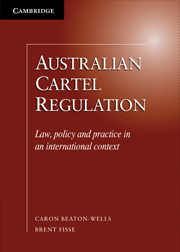Book contents
- Frontmatter
- Contents
- About the authors
- Preface
- Acknowledgements
- Abbreviations
- 1 Introduction
- 2 The legal framework governing cartel conduct
- 3 Collusion (contracts, arrangements, understandings)
- 4 Cartel and other provisions
- 5 Fault elements of the cartel offences
- 6 Individual liability for cartel conduct
- 7 Corporate liability
- 8 Exceptions
- 9 Enforcement policy
- 10 Immunity and cooperation policies
- 11 Sanctions
- 12 Compliance and liability control
- 13 Conclusion
- Appendix Trade Practices Act 1974 (Cth) Pt IV Div 1; Pt IV Div 2 s 45
- Index
12 - Compliance and liability control
Published online by Cambridge University Press: 05 December 2011
- Frontmatter
- Contents
- About the authors
- Preface
- Acknowledgements
- Abbreviations
- 1 Introduction
- 2 The legal framework governing cartel conduct
- 3 Collusion (contracts, arrangements, understandings)
- 4 Cartel and other provisions
- 5 Fault elements of the cartel offences
- 6 Individual liability for cartel conduct
- 7 Corporate liability
- 8 Exceptions
- 9 Enforcement policy
- 10 Immunity and cooperation policies
- 11 Sanctions
- 12 Compliance and liability control
- 13 Conclusion
- Appendix Trade Practices Act 1974 (Cth) Pt IV Div 1; Pt IV Div 2 s 45
- Index
Summary
Introduction – corporate implications of the anti-cartel legislation for compliance and liability control
The aim of this chapter is to examine the main implications of the Australian anti-cartel regime for corporate compliance and liability control. The implications are wide-ranging and go far beyond those fostered by narrow conceptions of trade practices compliance programs.
Considerable scepticism has been expressed about the capacity of compliance programs to prevent unlawful conduct in general and cartel conduct in particular. This chapter does not seek to refute or confirm that scepticism. Nor does it try to tackle the wider and deeper subject of why corporations and those who act for them obey or do not obey the law. The focus is on what the Australian anti-cartel legislation means for compliance and for liability control systems. The main theme is that, in designing or reviewing corporate internal controls, it is instructive to consider the implications of a liability control framework and that ‘compliance’ is too limited a framework.
Three points of terminology need to be made clear. First, ‘internal controls’ refers generally to any policy, procedure, process or incentive used as a means of guarding against breaches of the law. The term is not used in the financial auditing sense of accounting controls. Second, ‘liability control’ means the corporate practice of using internal controls to prevent or minimise the risk of liability, or to mitigate or shift loss if liability is imposed. ‘Liability’ in this context means any form of criminal or civil liability that may arise from cartel conduct, and any form of loss from informal sanctions such as adverse publicity from media comments about a corporation’s involvement in cartel conduct. Third, ‘compliance’ means the corporate practice of using compliance policies and procedures to prevent or minimise the risk of liability, or to mitigate loss if liability is imposed.
- Type
- Chapter
- Information
- Australian Cartel RegulationLaw, Policy and Practice in an International Context, pp. 533 - 566Publisher: Cambridge University PressPrint publication year: 2011



